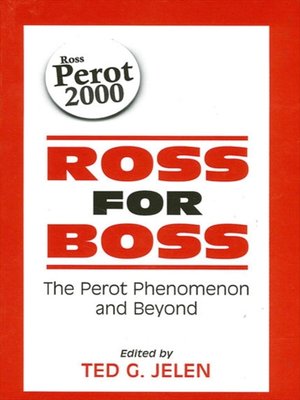Ross for Boss
ebook ∣ The Perot Phenomenon and Beyond · SUNY series on the Presidency: Contemporary Issues
By Ted G. Jelen

Sign up to save your library
With an OverDrive account, you can save your favorite libraries for at-a-glance information about availability. Find out more about OverDrive accounts.
Find this title in Libby, the library reading app by OverDrive.



Search for a digital library with this title
Title found at these libraries:
| Library Name | Distance |
|---|---|
| Loading... |
Ross for Boss provides insights into the sources, continuity, and enduring importance of Ross Perot's presidential candidacies in 1992 and 1996 as a member of the Reform Party, and evaluates the impact of the Perot phenomenon on the future of both public policy and the U.S. party system. Using theoretical and historical literature on third parties and independent candidates, the contributors identify the sources of Perot's support and opposition among political activists and the mass public.
Perot's supporters are understood as "zealots of the center" who resist partisan and ideological polarization. Perot himself, the authors suggest, was a master showman, able to use classical theatrical forms to establish himself as an improbable, yet inevitable, leader of a mass movement. His support came from people whose economic interests were directly threatened by increases in the global scope of the U.S. economy, and—like other third party candidates of the twentieth century—from those without formal religious affiliations. Comparisons of the 1992 and 1996 campaigns show that the decline in support for Perot was, for the most part, uniform across geographic regions and demographic groups.
Perot's supporters are understood as "zealots of the center" who resist partisan and ideological polarization. Perot himself, the authors suggest, was a master showman, able to use classical theatrical forms to establish himself as an improbable, yet inevitable, leader of a mass movement. His support came from people whose economic interests were directly threatened by increases in the global scope of the U.S. economy, and—like other third party candidates of the twentieth century—from those without formal religious affiliations. Comparisons of the 1992 and 1996 campaigns show that the decline in support for Perot was, for the most part, uniform across geographic regions and demographic groups.







